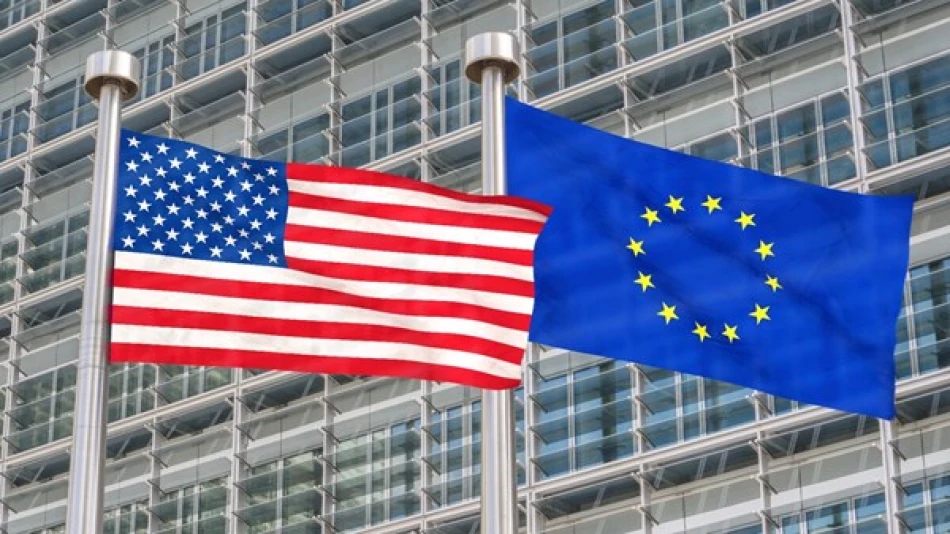
EU Experts Negotiate US Tariffs: Securing Trade Deals for a Stronger Global Economy
EU Scrambles to Avert Trump's 30% Tariff Threat as Trade War Looms
The European Union has dispatched a team of trade experts to Washington for urgent technical negotiations as President Donald Trump's deadline approaches for imposing 30% tariffs on EU imports. Despite months of diplomatic efforts, the bloc finds itself racing against time to secure a framework agreement that could prevent a damaging escalation in transatlantic trade relations.
High-Stakes Diplomacy Intensifies
European Trade Commissioner Maroš Šefčovič is scheduled to hold phone discussions with U.S. Trade Representative Jamieson Greer later today, according to a European Commission statement. This follows undisclosed talks between Šefčovič and U.S. Commerce Secretary Howard Lutnick yesterday, signaling the urgency both sides attach to finding a resolution.
The flurry of diplomatic activity reflects the high stakes involved. A 30% tariff rate would represent one of the most severe trade penalties imposed between major economic partners in recent decades, potentially disrupting billions of dollars in bilateral commerce.
Trump's Demands and Strategic Calculations
Trump has framed his tariff threat around reducing the U.S. trade deficit with the EU, demanding either lower European tariffs on American exports or the relocation of European production facilities to American soil. This approach mirrors his broader "America First" trade philosophy, which views trade deficits as inherently problematic and seeks to rebalance them through aggressive negotiation tactics.
The strategy represents a continuation of Trump's first-term playbook, where tariff threats served as negotiating leverage to extract concessions from trading partners. However, the 30% rate being discussed would exceed most tariffs imposed during his previous presidency, suggesting an escalation in approach.
EU's Cautious Optimism Meets Firm Resistance
Despite the mounting pressure, EU officials maintain cautious optimism about reaching a framework agreement to defuse tensions. This measured confidence likely stems from their experience navigating Trump's negotiating style during his first term, when similar threats were often followed by last-minute deals.
However, the EU is simultaneously preparing for confrontation. Trade ministers from member states declared Trump's proposed tariffs "completely unacceptable" during Monday's meeting and began examining retaliatory measures targeting American products. This dual approach—diplomatic engagement coupled with preparation for trade retaliation—reflects the bloc's learned response to Trump-era trade diplomacy.
Market and Economic Implications
The potential 30% tariff represents a significant escalation that could reshape transatlantic trade flows. European exporters, particularly in automotive, machinery, and luxury goods sectors, would face substantial cost increases that could price them out of the American market. Conversely, American consumers would likely face higher prices on European imports, from German cars to French wines.
For investors, the uncertainty creates both risks and opportunities. European export-dependent companies are vulnerable to tariff implementation, while American competitors could benefit from reduced European competition. Currency markets are also likely to react to any escalation, with the euro potentially weakening against the dollar if tariffs are imposed.
Historical Context and Precedent
This confrontation echoes previous transatlantic trade disputes, but with potentially greater consequences. The 30% rate being discussed would represent one of the highest tariff levels between developed economies since the trade wars of the 1930s. Even during Trump's first presidency, most tariffs peaked around 25% on specific products rather than broad categories of imports.
The timing also matters. Unlike Trump's first term, when global trade was growing, the current environment features slower economic growth and greater geopolitical tensions, making the economic impact of a trade war potentially more severe.
Path Forward
The coming days will likely determine whether diplomatic engagement can prevent a significant escalation in trade tensions. The EU's strategy of combining negotiation with preparation for retaliation suggests they view Trump's threats as serious while maintaining hope for a negotiated solution.
Success will likely require the EU to offer concrete concessions on market access or regulatory alignment, while Trump will need to demonstrate that his threats can achieve meaningful results without triggering a broader trade war that could harm American consumers and businesses.
Most Viewed News

 Layla Al Mansoori
Layla Al Mansoori






